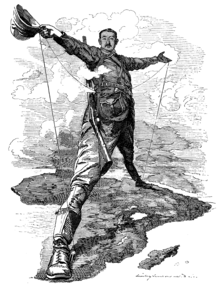British South Africa Company

The British South Africa Company ( BSAC or BSACO , dt. British South Africa Company , unofficially also Chartered Company ) was a British commercial enterprise that developed and administered areas of "Zambezia" - today Zimbabwe and Zambia . It was founded by Cecil Rhodes and Alfred Beit .
The Englishman Charles Rudd had acquired the exclusive rights to metals and minerals in his kingdom from the Matabel ruler Lobengula in 1888 on behalf of the South African goldfield company. A short time later, Edward Arthur Maund appeared on behalf of the Exploration Company with equal and other claims.
Rhodes, Member of Parliament on the Cape and founder of the De Beers Diamond Mining Company in Kimberley , finally knew how to settle individual interests and found the British South Africa Company with Alfred Beit. Beit took care of the company's finances. He and Rhodes took over £ 120,000 worth of shares , De Beers took over £ 200,000, Gold Fields took nearly £ 100,000 and the Exploration Company took over £ 75,000. The company sold mining rights primarily in Rhodesia on condition that a 50% stake in the ore discoveries was made. The company received a letter of protection ( Royal Charter ) from the British government on October 15, 1889 , which granted it almost complete independence in the administration of Matabele, Maschona and Manikaland . Only external relations were reserved for Great Britain. From 1899 the BSAC also exercised control over the Barotseland , later called Northwest Rhodesia, and from 1900 also over Northeast Rhodesia.
An expedition under Colonel Pennefather occupied Southern Rhodesia in September 1890. When they later advanced against Manika, there was a bloody conflict with the Portuguese at Massi Kessi in May 1891 . As a result, the British government forced a contract on June 11, 1891, by which Manika and their gold fields passed into the possession of the BSAC.
The Matabele under Lobengula were defeated in 1893 and brought under the direct rule of the British South Africa Company in 1896. A lot of settlers and gold diggers soon poured into the new colony . In 1897 there were around 7,000 whites and in 1899 the capital Bulawayo alone had 4,000 inhabitants. The new, remote colony was immediately opened up by two railway lines. The first, from Mafeking , the administrative center of British Bechuanaland , to Bulawayo, was built from 1896 to November 1897. The second, between Beira in Mozambique, then Portuguese, and Salisbury, today's Harare , was opened to traffic on May 1, 1899.
As the Jameson Raid showed, the British South Africa Company was an instrument of British colonial policy, which gave London the opportunity not to appear as a direct actor. From January 1898, the BSAC was under "very tight" control by the British colonial authorities. This duplicate British policy of violence in Africa south of the Zambezi was expressly condemned internationally. In addition, when the BSAC was founded, it was obliged to make the British Empire its heir.
swell
- ^ Christian Justus: The life and work of the Hamburg merchant Alfred Beit. Master's thesis, University of Hamburg 1990
- ^ Roy Macnab: Gold Their Touchstone. Jonathan Ball Publishers , 1987, p. 23
- ↑ Henning Albrecht, Alfred Beit, Hamburger and Diamond King. Patrons of Science Volume 9. Hamburg Scientific Foundation, Hamburg 2011, p. 60
literature
- Henning Albrecht : Alfred Beit, Hamburg and diamond king. Patrons of Science Volume 9. Hamburg Scientific Foundation, Hamburg 2011 (PDF file; 4.32 MB)

